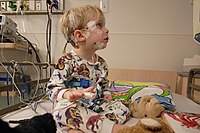
Photo from wikipedia
Behavioural sleep problems are very common in children and are concerns for many parents. This review discusses normal sleep physiology and sleep development and focuses on common behavioural sleep problems… Click to show full abstract
Behavioural sleep problems are very common in children and are concerns for many parents. This review discusses normal sleep physiology and sleep development and focuses on common behavioural sleep problems in childhood, including behavioural insomnia of childhood, parasomnias and sleep-related movement disorders, highlighting their clinical features and management. Behavioural insomnia of childhood is characterised by learned difficulties in falling asleep and/or staying asleep. Management includes establishing bedtime routines and behavioural techniques. Parasomnias include confusional arousals, sleepwalking, sleep terrors and nightmares, and these usually resolve with time. Management includes parental reassurance and behavioural interventions such as scheduled awakening. With regards to sleep enuresis, management includes behavioural modifications, enuresis alarm and desmopressin. Sleep-related movement disorders include sleep-related bruxism and sleep-related rhythmic movements, of which body rocking is the most common. Early identification and management of behavioural sleep problems may prevent their negative impact on children as well as their families.
Journal Title: Singapore medical journal
Year Published: 2023
Link to full text (if available)
Share on Social Media: Sign Up to like & get
recommendations!